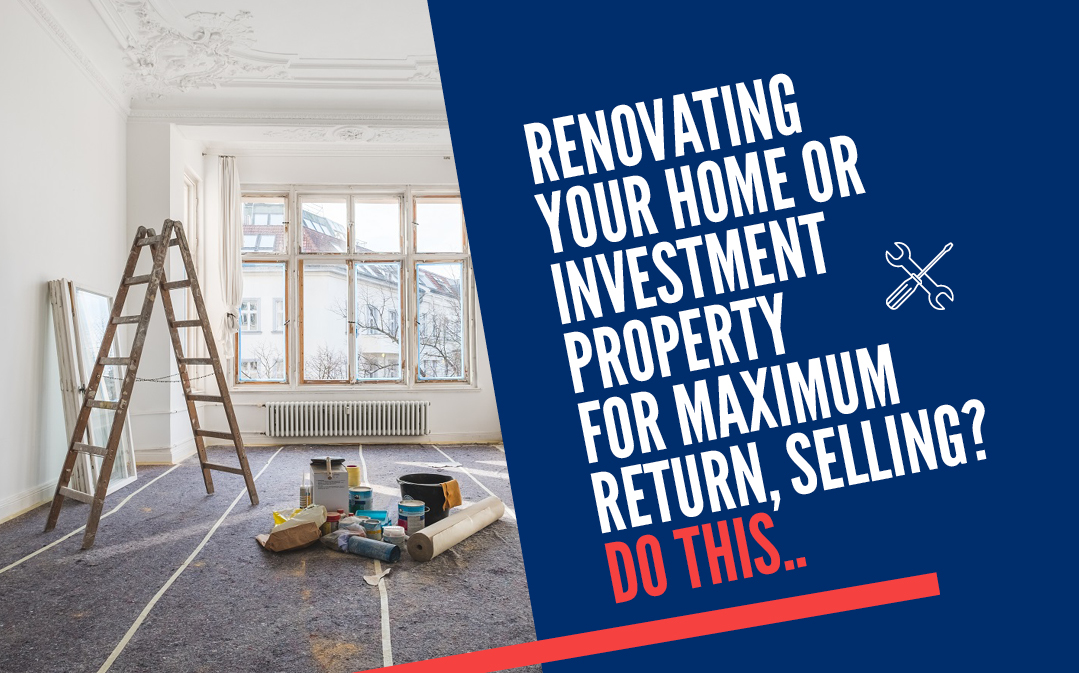Renovating your home or investment property for maximum return
Renovating your home or investment property before putting it on the market is a savvy strategy to maximise the return on your investment. A pre-sale renovation can significantly increase the property’s sale value, attract a wider range of buyers, leave less room for buyer negotiations, and ultimately lead to faster and more profitable sale.
In this blog post, the experts at Capital Properties explain why planning your pre-sale renovation is worth the effort and we’ll provide you with practical tips for budgeting and planning a successful renovation project.
Capital Properties FREE Discovery Session will help you with your next stage in property investment. Whether you’re just getting started or planning to renovate your investment property so that you can move onto the next project – we’ve got you.
Our Property Investment Tools & Apps and Capital Properties Pinnacle Support Program will support you every step of your property investment journey.
On the go? Here’s 30 seconds of take outs:
- A pre-sale renovation can increase the property’s sale value, attract more buyers, save on negotiations, and result in a faster, more profitable sale.
- Determine your budget by comparing local property sales price and how much value you can add with renovations.
- Carry out a property assessment & create a checklist of work. Start with the biggest jobs, e.g., structural issues, then landscaping and consider any layout changes and electrical/heating upgrades.
- Next, complete cosmetic repairs and consider professional styling.
- Finally, think about where else you might be able to add value to attract your ideal buyer.
Keep reading >>
Is renovating your investment property really worth it?
In most cases, yes, renovating your investment property makes good business sense. We’ll cover the main reasons here:
- Higher property valuation
We’ve discussed this before in our blog post “How to get a better valuation on your property”. A higher property valuation will strongly influence the sale price of your property before it even comes to market.
- Maximise sale price
It’s important to look objectively at your property before you go to sell it. If you notice that some improvements need to be made, then so will your buyers. Some buyers will be put off by the work that needs to be done and others might question the value of the property and use it as a tool to negotiate a lower price. By making some calculated improvements (see below), you can set a higher asking price for more profit.
- Speed of sale
A move-in-ready investment property is more likely to stand out in a competitive real estate market and sell faster. With less time on the market, you’ll also reduce holding costs such as mortgage payments, property taxes and insurance.
- Better range of buyers
A well-renovated investment property with modern amenities will appeal to a broader range of buyers, from first-time homeowners to experienced investors.
- Less negotiations
Humans are hard-wired to spot problems. And if we find one, we’ll look for more. There are few things more annoying than a buyer coming to you with a list of snags they want addressed before they’ll make an offer. It’s far better to sort out any issues pre-sale to avoid the need for negotiations. Buyers are usually more willing to pay a premium for a property that requires less attention or repairs, giving you more control over the selling process.
On the flip side however, there are some cons to carrying out a renovation. Of course, you’ll have to cover the costs for the renos, and you may lose some rent while you revamp – so sticking to a schedule is vital. Plus, there are some tax implications. Although you will be able to claim some of the construction costs through capital works deductions, you can’t claim renovations as an immediate tax deduction. Plus, there’s some potential depreciation value loss from getting rid of old appliances. Learn more about this in our blog post “Tax depreciation reports 101.”
We’ll explain how careful planning of your pre-sale reno will help you mitigate these downsides.
Setting your pre-sale renovation budget
Planning your pre-sale renovation might seem daunting at first. That old adage of spending money to make more sounds great in theory, but there’s always the question of whether you’ll be compensated with the return of investment (ROI).
The first step to planning your pre-sale renovation is to set your budget. Only then can you develop a plan that will maximise your property pre-sale renovations.
Research the local real estate market conditions. What are comparable properties selling for? What’s the difference in costs between fully renovated properties and unrenovated homes? Ask your local real estate agent for their opinion; for example, should you consider adding an extra room, e.g. converting a study into a bedroom for a family property, or adding an external study to facilitate work-from-home? How much has your property increased in value since you purchased it?
At the end of this research, you should have a figure of how much value you can add with renovations and know when to draw the line so that you don’t over-capitalise. The next step is to research renovation costs and get quotes for the work. To do this you’ll need to carry out a property renovation assessment.
Property renovation assessment
Walk around the property – with your real estate agent if possible – and make a list of anything that needs attention. Whether it’s outdated fixtures, worn-out flooring, overgrown landscaping or cosmetic improvements that’ll boost the property’s appeal.
Prioritise the key areas that make the biggest impact on the buyer, i.e., kitchens, bathrooms, and flooring. As an ADF member it’s unlikely you’ll have the time to carry out the renovations yourself, so the next step is to get quotes from a few different contractors to ensure competitive costs. Just bear in mind that although price is important, you need to make sure the contractor has a reputation for quality, experience and delivering the project on time.
Planning your pre-sale renovation
We strongly suggest that you appoint a project manager to create a project plan and oversee the renovations. It’s possible that you may need painters, carpenters, builders, landscapers, gardeners, stylists etc on site, so create a timeline so that everyone understands what’s happening and when. It makes sense to start by tackling the biggest/messiest problems first. Here’s where we’d start:
Fix any structural issues, e.g., repair the roof, stabilise walls and fix leaks.
Begin landscaping/clearing and planting early so that it’ll look great when it comes to market.
Next look at whether the layout could be improved. For example, consider knocking a wall through to make a larger, open plan living/kitchen area that will appeal to families and add more value to the property.
- Upgrade electrics to bring them up to standard and install additional sockets and replace light switches with dimmers.
- Upgrade to more efficient heating and appliances.






